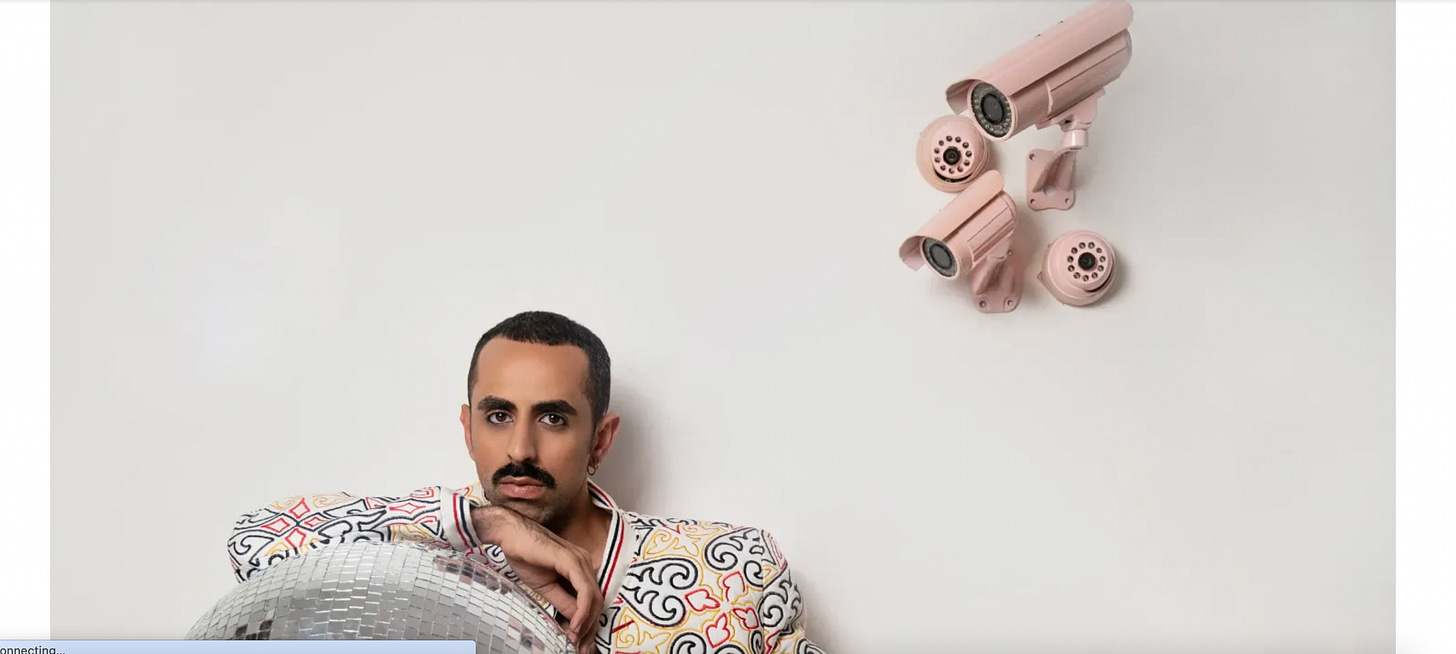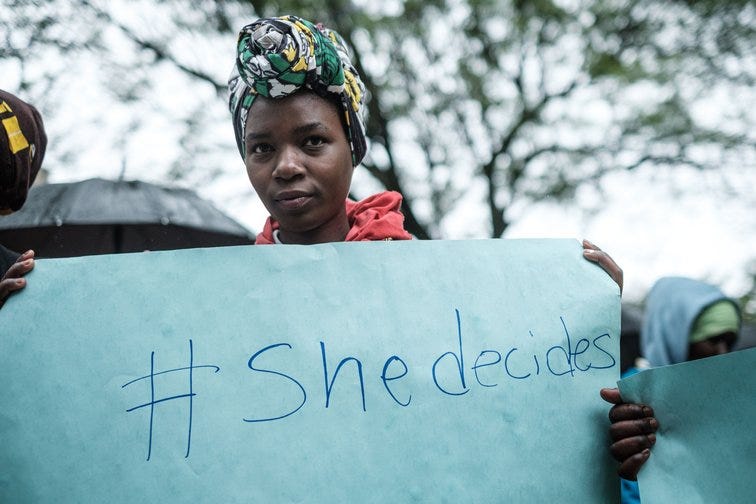Global Roundup: Palestinian Pop Star, Liberia Women in Politics, Thailand Same-Sex Marriage Bill, Kenya Harmful Ads, Uganda Women’s Birding Club
Curated by FG Contributor Samiha Hossain
Photo by Julie Dakwar
Born into a musical family, Murad dreamed of being a performer and a big entertainer. His father, Said Murad, was a founding member of the iconic Palestinian band Sabreen, whose discography combines Arab and Western compositions with poetry by seminal Palestinian and Arab writers, including Mahmoud Darwish, Fadwa Tuqan, Hussein Barghouthi, and many more. A pop artist, Murad’s music pushes the boundaries of what most people might understand as pop.
The beauty of pop is in its freedom. Music for the masses, and my mission has always been to bring Palestine into the mainstream. -Bashar Murad
Murad discusses his latest release, a cover of “Mawtini”, the unofficial Palestinian national anthem. “Mawtini” (“my homeland” in English) was originally composed in 1934 by Ibrahim Tuqan, a poet from Nablus, Palestine. Although it would later be replaced with the official anthem “Fidai'i”, after the British Mandate, “Mawtini” remains a defining song of Palestinian land and struggle; recently, a video of doctors in Gaza singing it circulated online.
That’s why I felt like it was the right time to release it, because a lot of people wanted to claim that everything is happening in a vacuum. I didn’t want to just share stories to prove that it is not; I felt that if I shared the song that we’ve been singing for so long it would help get that point across. -Bashar Murad
Murad believes artists have a huge responsibility to demand a ceasefire and use their voices to stop Israel’s genocide in Gaza. He adds that a ceasefire is not the end, it is just the beginning. Murad recognizes that as a Palestinian artist, any art that he makes is inherently political. Murad also talks about queer Palestinians and the dangers of pinkwashing.
As Palestinians, we are all suffering from the same occupation. We believe that our fight for freedom is from all kinds of oppression…We are hungry for absolute freedom. Despite all this horrible shit that is happening right now, the queer community worldwide is seeing through Israel’s pinkwashing smokescreen…So it’s important to not let the queer identity be hijacked in order to justify atrocities against Palestinian people, queer and non-queer alike. -Bashar Murad
Wokie Dolo in a white shirt on the campaign trail during the October 10 elections, where she vied for the position of Representative in Montserrado County Electoral District #10.
In 2023, as Liberia held its presidential and legislative elections, women candidates reported experiences of sexism. This treatment of women candidates comes at a time when women make up a low percentage of candidates for elective office. In the just concluded election, out of the 1030 Representatives candidates, 152 were women, according to the National Election Commission (NEC).
Wokie Dolo still vividly remembers the early morning call when she learned that a picture of her smoking a cigar had gone viral on Facebook. It was accompanied by several degrading and sexist comments. This all happened at the height of her campaign for a seat in the House of Representatives. The picture had been posted by one of her opponents.
I remembered a candidate posted my pictures when I had the cigar, saying 'Is this the person that you want your children to follow?’ -Wokie Dolo
In 2006, Liberia elected Ellen Johnson Sirleaf as the first woman president in Africa. But seventeen years later, the number of women seated in elective offices is still low. Mmonbeydo Nadine Joah, an attorney who heads the Organization for Women and Children, says women are bullied on social media because their opponents want to discourage them from politics.
In addition to online harassment and attempts at shaming, one of the major obstacles faced by women candidates has been a lack of funding. Running as an independent candidate is more expensive than running on a party ticket. And candidates (whether independent or on a party ticket) need to show a bank balance of $10,000.
The low number of women in the legislature has slowed the passage of laws related to women’s issues, including gender-based violence, advocates say. In 2019, President George Weah signed the Domestic Act to abolish all forms of violence against women, children, and men. But five years later, advocates say not much has been done by the police and other authorities to ensure that perpetrators of domestic violence are punished.
Liberian advocates have campaigned for more women in the legislature citing overwhelming evidence that greater representation leads to better economic and democratic outcomes and improvement in the lives of women and children. To improve the prospects of women candidates, UN Women worked with Sister Aid to set up a leadership clinic for women candidates in Liberia. However, Marvelene Lepukoi, an unsuccessful candidate in Bong County’s District 4, disagrees with this approach.
We have had too much training. If the international community believes in women's leadership, if they want to see Liberia having a dominant female leadership, they should invest real money into candidates. Let them give the money for us to compete with our male counterparts. -Marvelene Lepukoi
More campaign funds won’t stop the persistent online violence against women in politics, says Joah. So she partnered with other advocacy groups to monitor incidences of violence against women during elections. In 2017, they launched the Project Accountable Safe Space Women’s Accountability Room (PASSWAR).
Sean L’Estrange poses with his husband Chakgai Jermkwan inside their bar, The Stranger Bar House of Drag Queens, in Bangkok, Thailand. December 12, 2023. Thomas Cristofoletti/Ruom/Handout via Thomson Reuters Foundation
With a bill to legalise same-sex marriage back in the Thai parliament in December 2023, gay couples are beginning to hope. Sean L'Estrange and Chakgai Jermkwan got married 11 years ago in a small ceremony at Cambridge City Hall in the U.S. city of Boston. Then, the two men flew back to their home in Bangkok, where they run a drag bar together. In Thailand, however, they were no longer married as same-sex unions are not recognised. L'Estrange and Jermkwan are among many couples hoping that 2024 will see Thailand become the first Southeast Asian nation to legalise same-sex marriage.
In November, the cabinet approved a draft marriage equality bill, which is thought to replace the terms "husband" and "wife" with "spouse", and give LGBTQ couples the same rights as heterosexual couples when it comes to medical consent and passing on wealth. After the cabinet approved the bill, Prime Minister Srettha Thavisin said the bill would be brought to parliament during a session starting in December.
The government's decision is a monumental step for Thailand to provide full and equal rights for LGBTI+ people. So far, prolonged delays have meant prolonged discrimination against the LGBTI+ community, and we have already been waiting for too long for these fundamental rights. -Mookdapa Yangyuenpradorn, Thailand human rights associate at NGO Fortify Rights
Furthermore, a house committee studying the marriage equality bill will invite influential members of the LGBTQ community to become advisers so that they can provide their input. The committee expects a bill to be passed into law this year. The final version of the bill will be the first in history to include public participation in an amendment process, and it will be the first step towards equality for members of the LGBTQ community in the country.
A woman holds a message that reads "She decides" as women from various informal settlements in Nairobi call for empowerment of women and girls in the grass-roots in Nairobi, Kenya, on November 13, 2019. Photo: YASUYOSHI CHIBA/AFP via Getty Images
Campaigners say that digital platforms like Jumia, Google and Meta are profiting from harmful ‘vaginal detox’ products in Kenya. Eve Waruingi, who lives in Nairobi, decided to order yoni pearls from online shopping website Jumia to treat her polycystic ovarian syndrome (PCOS) symptoms. Reviews on the website claimed the product could cure PCOS – according to the World Health Organization (WHO), however, PCOS is incurable and chronic. Waruingi ended up developing an internal infection caused by the contents of the yoni pearls.
Like many other online retailers and social media platforms, Jumia Kenya, a subsidiary of the Nigerian based e-commerce platform Jumia Group, is still promoting and selling a variety of ‘vaginal detox’ products such as yoni pearls, vaginal tightening gels and vaginal steaming herbs.
The Pharmacy and Poisons Board had issued an alert in August advising against the use of yoni pearls on grounds of “quality, safety or efficacy”. It followed an investigation that found Facebook, YouTube, Google and Instagram had been profiting from content that posed a risk to the sexual and reproductive health of women in Kenya. The investigation, by the organisation Fumbua, accused the internet giants of “structural racism” by failing to protect Kenyan women from being targeted with dangerous misinformation on unapproved medical treatments. According to Fumbua, products that claim to “cleanse, detoxify, or improve the health of the vagina” such as yoni pearls, yoni steams and yoni candies are being aggressively pushed at Kenyan women online.
We have laws that address disinformation but they are interpersonal in nature. We don’t have a framework that holds platforms accountable with regard to moderation of content. -Wanjuri Nguhi, Program Manager at Fumbua
Nguhi attributes the tech giants' blatant disregard for Kenyan women’s safety against such “predatory marketing” to a “lack of accountability on a structural level”.
Photo by Badru Katumba/The Guardian
We are here to break male dominance in the field of birding. There are very few female birders in Uganda. The tourism industry in general is yet to fully appreciate women. -Judith Mirembe, chair of the Uganda Women Birders Club
Tour companies describe Uganda as a paradise for birdwatchers. About 50% of Africa’s bird species, and 11% of the world’s, are found here. Uganda has the highest concentration of birds in Africa. At the International Conference for Women Birders the club hosted in Uganda earlier this month, women enthusiasts from all over the world met to discuss their unique challenges and discuss how, together, they can bring more money to women in the sector. Mirembe notes the high costs associated with birding and how cultural expectations of women as caregivers mean their spouses may not let them go for week-long birdwatching tours.
Members of Uganda’s Women Birders Club, which started in 2013, meet every Sunday. It is a training ground and a support network. Many of the women already have careers in tourism and wildlife. Others join to make new friends and learn.
There was a time when birding could be a hazardous pursuit for women. People would see women with binoculars, accuse them of trying to steal land and beat them up. Others could be hostile to the women because they wore trousers – a taboo in some Ugandan cultures. The women recall tour operators who would send them to the field with drivers who’d sexually harass them and tourist accommodation where the women would be put in a shared room with men. Uganda was the first country in Africa to start a female birders’ club, and today there are similar associations in Rwanda and Kenya.
We must not let fear hold us back from opportunity. We need to keep it going against all odds. -Judith Mirembe
Samiha Hossain (she/her) is an aspiring urban planner studying at Toronto Metropolitan University. Throughout the years, she has worked in nonprofits with survivors of sexual violence and youth. Samiha firmly believes in the power of connecting with people and listening to their stories to create solidarity and heal as a community. She loves learning about the diverse forms of feminist resistance around the world.






